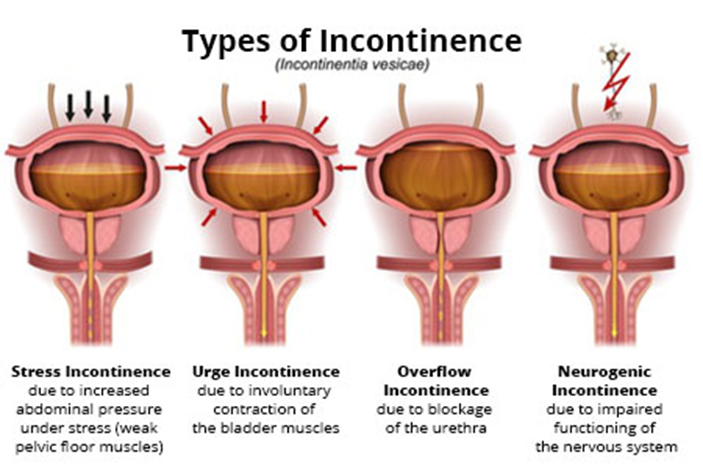A nurse is caring for a client who tells the nurse she experiences urinary incontinence when she sneezes. The nurse recognizes this is an expected finding for which of the following types of incontinence?
Stress incontinence
Urge incontinence
Overflow incontinence
Reflex incontinence
The Correct Answer is A
A. Stress incontinence
Stress incontinence is the involuntary loss of urine during activities that increase intra-abdominal pressure, such as sneezing, coughing, laughing, or lifting heavy objects. In stress incontinence, the pelvic floor muscles are weakened, leading to inadequate support of the bladder and urethra. This results in leakage of urine during moments of increased pressure on the bladder.
B. Urge incontinence
Urge incontinence involves a strong and sudden urge to urinate, leading to involuntary urine loss. It is often associated with an overactive bladder and may not be related to increased abdominal pressure.
C. Overflow incontinence
Overflow incontinence occurs when the bladder is unable to empty completely, leading to constant dribbling of urine. It is often associated with conditions that obstruct urine flow, such as an enlarged prostate in men.
D. Reflex incontinence
Reflex incontinence is characterized by the involuntary loss of urine due to a reflex arc that bypasses normal control mechanisms. It is often associated with neurological conditions that affect bladder control.

Nursing Test Bank
Naxlex Comprehensive Predictor Exams
Related Questions
Correct Answer is A
Explanation
A. "Eating yogurt can help decrease gas odor that I have."
This is the correct choice. Yogurt contains probiotics, which can contribute to a healthy balance of bacteria in the digestive system, potentially reducing gas odor associated with a colostomy.
B. "I should eliminate pasta from my diet so that I don’t have as many loose stools."
This statement is incorrect. Pasta, as a general rule, is not associated with causing loose stools. Dietary adjustments should be individualized, and specific triggers for loose stools vary among individuals.
C. "My largest meal of the day should be in the evening."
While meal timing can vary based on personal preferences and lifestyle, there is no strict rule that the largest meal must be in the evening. It depends on individual habits and dietary needs.
D. "Carbonated beverages can help control odor."
This statement is incorrect. Carbonated beverages are not typically associated with controlling odor related to a colostomy. In fact, they may contribute to increased gas production, potentially exacerbating odor issues.
Correct Answer is D
Explanation
A. Clean the perineum from front to back.
After arranging the sterile items, the next step involves preparing the client for catheter insertion, which includes cleaning the perineum from front to back using appropriate techniques to minimize the risk of infection.
B. Lubricate the catheter.
Following the preparation of the client, the next step involves lubricating the catheter before insertion. Lubrication facilitates the smooth and atraumatic insertion of the catheter.
C. Explain to the client that she will feel temporary discomfort.
Providing information and preparing the client for the procedure is an important aspect, but it typically follows the physical preparation steps. Explaining to the client about potential discomfort should be done before the procedure but after the necessary physical preparations are complete.
D. Arrange the sterile items on the sterile field.
This is the first action to be taken. It involves preparing all the necessary sterile items on a sterile field, ensuring that everything needed for the catheter insertion procedure is organized and ready to maintain aseptic technique.
Whether you are a student looking to ace your exams or a practicing nurse seeking to enhance your expertise , our nursing education contents will empower you with the confidence and competence to make a difference in the lives of patients and become a respected leader in the healthcare field.
Visit Naxlex, invest in your future and unlock endless possibilities with our unparalleled nursing education contents today
Report Wrong Answer on the Current Question
Do you disagree with the answer? If yes, what is your expected answer? Explain.
Kindly be descriptive with the issue you are facing.
